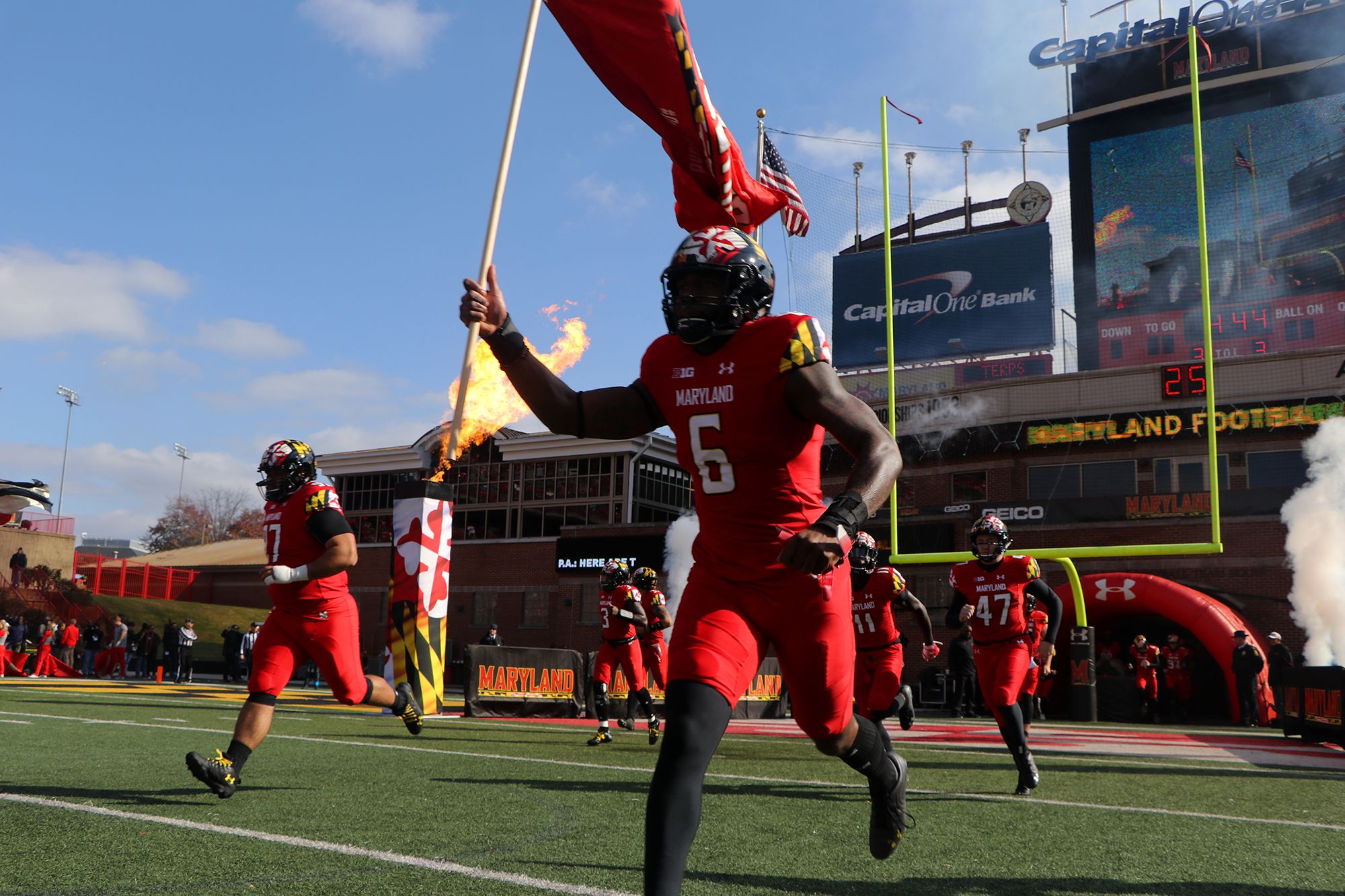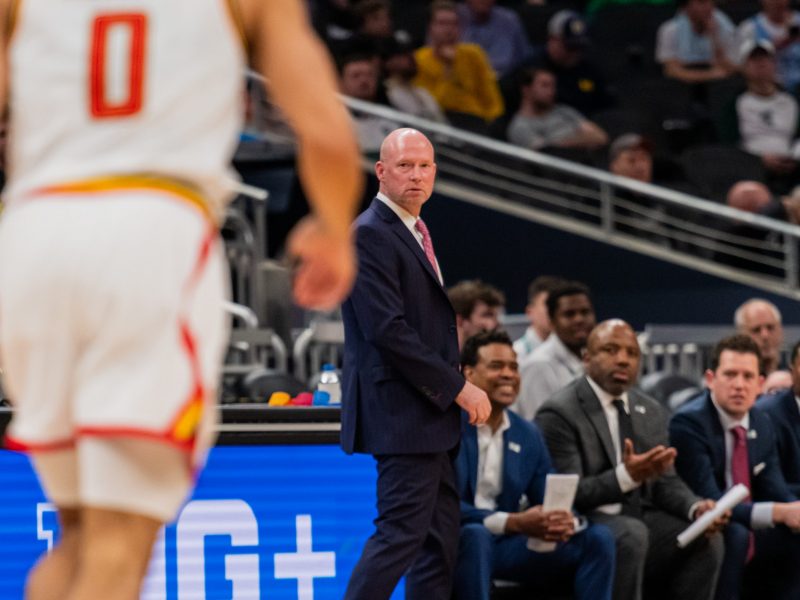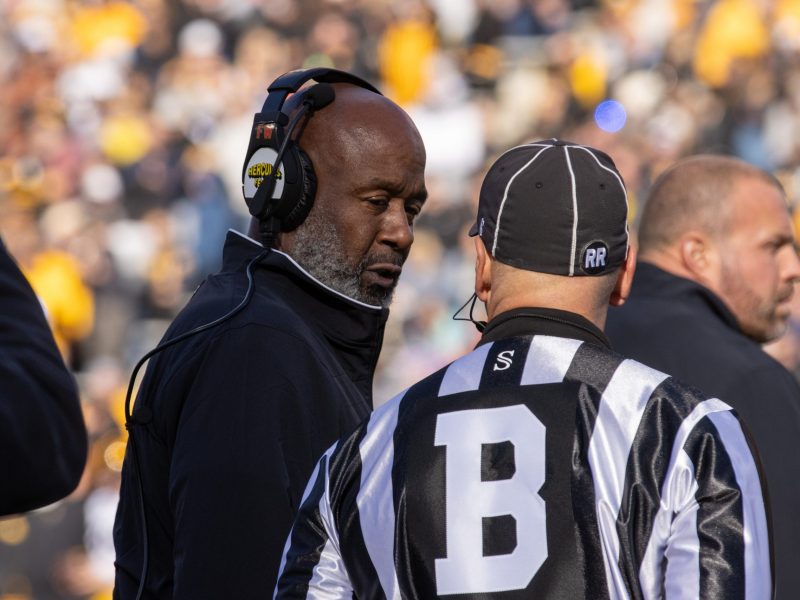After Maryland football’s season-ending loss to Penn State on Nov. 24, interim head coach Matt Canada made his way around the locker room, looking at each player from the Terps’ 5-7 campaign.
“It was a tough locker room,” Canada said. “It was fun to get to know them.”
For Canada and the team, the season was tough from start to finish. When Canada joined the Terps in January as offensive coordinator, he didn’t expect to be at the helm by August. And even then, he didn’t expect to learn the defensive players’ names as well as he did, having called himself the “cheerleader” for that unit on multiple occasions.
But as he momentarily choked up during his opening statement following that 38-3 defeat to the Nittany Lions, the culmination of a year so rocked by tragedy and abnormality seemingly hit Canada as he commended his players, who weathered it all — a teammate’s death, firings, external investigations and ever-present questions — to reach the brink of postseason play.
Maryland’s 2018 on-field product and off-field catastrophe are intrinsically linked. Training staff failures led to Jordan’s McNair’s death, and the Terps left an offensive line position open before the first play of their season opener. Coach DJ Durkin was fired on Halloween, and Maryland managed just 100 yards of offense against Michigan State three days later.
And prior to Canada’s final game as interim head coach, there were plays throughout the season that amounted to five wins and what-ifs, all while the Terps combated a tempest swirling all around them.
“This season was filled with adversity,” defensive lineman Adam McLean said. “We lost our teammate.”
[Read more: Following the investigation into Maryland football’s culture]
From the No. 79 helmet stickers and flag flown before and after games to the No. 79 painted on Maryland Stadium’s field in three locations, McNair’s memory was in plain sight.
Canada tried to keep that perspective throughout media availabilities, commending his players’ focus. With it, he frequently shifted the blame after losses to his own coaching, rather than the players’ execution. It provided a buffer for his players while inviting criticism of Canada’s schemes.
Granted, there was plenty of blame to go around following the Terps’ week 3 loss to Temple. After two straight wins over Texas and Bowling Green, Maryland stumbled to an inexplicable degree against the Owls.
The signs of an ineffectual passing game poked through when quarterback Kasim Hill completed eight throws for 121 yards against the Falcons a week prior, but 444 rushing yards carried them to a 45-14 win. Against the Owls, though, the running game couldn’t make up for 63 passing yards. While the Terps’ defense and special teams scored, Canada’s offense didn’t.
“Ultimately, everything that doesn’t work is my fault, not Kasim’s,” Canada said Oct. 13. “Kasim’s working really hard and we’re going to keep coaching him, the wideouts, the backs and everybody.”
[Read more: Mike Locksley is Maryland football’s next coach, but some boosters aren’t convinced]
And looking back at the result of Maryland’s home opener, a win Sept. 15 would have vastly improved its chances at bowl eligibility.
While the Terps picked up wins over Minnesota, Rutgers and Illinois — the latter proving to be the best game of Hill’s career, with 265 yards and three touchdowns — understandable losses to ranked Michigan and Iowa squads put pressure on matchups with Michigan State and Indiana, the final two unranked foes on the schedule.
Then came Oct. 31.
Durkin, reinstated the day prior, was back at practice but still let Canada primarily coordinate proceedings. Durkin left the practice fields and headed into Gossett Football Team House, and by the time he left, he was fired.
As players left the facility, some expressed shock.
“A lot of people really just confused,” one player said. “You bring him back, it brings a lot of mixed emotions. Then you fire him, you know. Like, what was the point of bringing him back just to terminate him the next day?”
And three days later, those players took the field against the Spartans with a semblance of finality to endless speculation regarding Durkin. But the product was disjointed, the result was lopsided and players did not accompany Canada to the postgame press conference, ending the whirlwind week with a resounding dud.
“I really can’t speak to how the players feel about the week,” Canada said. “I think they played really hard and I don’t feel like we had any trouble playing hard.”
It was never a question of how hard Maryland was playing or the difficulties the team was facing.
But on many occasions, effort didn’t lead to results. And that fact became clear as the Terps ended the season with a four-game losing streak, ending hopes of a bowl game.
Against Indiana — Maryland’s best opportunity on paper to secure a sixth win — missed opportunities in the red zone, turnovers and penalties dug too big a hole to escape.
Hill overshot a wide-open Brian Cobbs in the end zone early, forcing Maryland to settle for its second field goal. The redshirt freshman completed 4-of-12 passes for 43 yards and an interception before tearing an ACL for the second straight year, ending his season. And while Tyrrell Pigrome found success in his stead and led the Terps back to a 32-31 lead late, his late fumble sealed a 34-32 defeat.
At that point, Maryland’s bowl chances seemed doomed. After its near-upset of then-No. 9 Ohio State the next week, Canada didn’t forget.
“Last week, everyone in the country said we were done, right?” Canada said Nov. 17, after facing the Buckeyes. “Said the freaking season’s over. Shouldn’t even play the last two.”
The Terps showed their future talent against Ohio State, but also displayed the shortfalls that held them out of bowl eligibility.
Anthony McFarland ran for 298 yards and two touchdowns — one of three running backs to score — and Jeshaun Jones caught a touchdown. But a misfire on an overtime two-point conversion attempt from Pigrome ended the contest. A 38-3 loss the following week to the Nittany Lions officially ended Maryland’s season.
Canada won’t be leading the Terps’ 2019 campaign. He was a finalist for the job, but athletic director Damon Evans instead hired Alabama offensive coordinator and former Maryland assistant Mike Locksley.
Locksley must act quickly. National Signing Day for recruits starts Dec. 19, and the Terps’ 2019 class is thinned down to eight players — all three-stars — representing the No. 85 class in the country, per 247Sports. Locksley will perhaps dip into the transfer market to shore up the roster short-term.
Transfers played a key role for this year’s defense with linebacker Tre Watson and defensive lineman Byron Cowart, but much of Maryland’s defense won’t be back next year. Along with Watson and Cowart, starters Jesse Aniebonam, Darnell Savage, Mbi Tanyi and RaVon Davis are departing.
But there’s a bevy of young talent on offense in McFarland, Jones, Cobbs and Dontay Demus.
“They’re developing each week,” McFarland said of the receivers last month. “The future is bright for those guys.”
And they might be enticing assets for an offensive-minded coach like Locksley.
Needless to say, the lasting legacy of the Maryland football season won’t be plays or games, but instead McNair’s death. That tragedy seemed to set back a program that had already struggled to compete in its new conference.
But Canada felt the performance of his team — one he led for only four months — showed that doesn’t have to be the case.
“This program is on the rise,” Canada said. “Everybody knows that, if you actually pay attention.”



